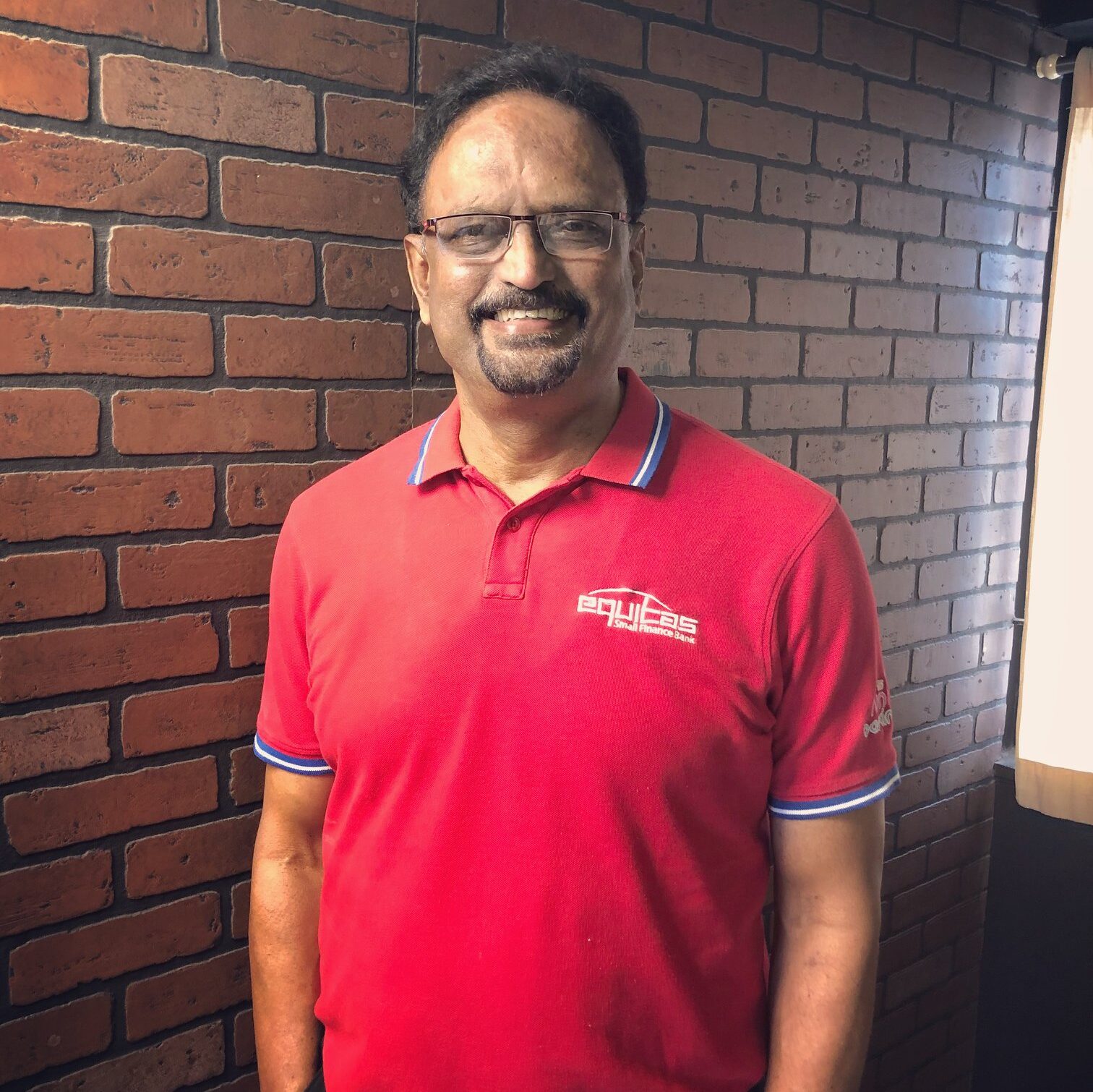“Access to credit is the key link foreconomic growth.”
John Alex shares with Marie Banu about Equitas and its programmes

John Alex serves as Group Head-Social Initiatives- Equitas Small Finance Bank & Programme Director of Equitas Development Initiatives Trust. He started his career as a Gazetted Officer in Tamil Nadu Government and served as Extension Officer (Agri) & Block Development Officer in North Arcot District, Tamil Nadu from 1979 to 1983. He worked for about 26 years with Indian Overseas Bank and took his voluntary retirement as Chief Manager.
He joined the Equitas management team in 2008 and conceptualized and set up the team for Social Initiatives with a clear focus to address a larger spectrum of requirements of small clients. The major focus was in the field of health, education, skill development, food security, placement for unemployed youth, and an inclusive model for persons with disability & trans gender community.
In an exclusive interview, John Alex shares with Marie Banu about Equitas and its programmes.
Can you tell us about Equitas, it’s philosophy and services?
Equitas was founded in 2007 and provided microfinance to women’s groups based on the Grameen bank model. Our core philosophy is to provide financial inclusion for the un banked income groups in a fair and Transparent manner. We focus on serving those who are not effectively serviced by the formal financial sector and to improve their quality of life.
We presently serve over three million clients under this segment which constitutes to one percent of Indian households. After we obtained the licence as a Small Finance (Scheduled Commercial) Bank in Sept 2016, our Product offerings has expanded. We now offer Savings, Deposits, Remittances, all types of loans, customized payment solutions/ digital solutions, FASTTAGs, Internet banking, Mobile banking, Wallet, Payment gate way solutions, Pension products, Mutual funds, PMS, and Life & General Insurance. Our vision is to serve five percent of Indian Households by 2025.
Equitas has grown phenomenally, reaching out to 2.5 million active borrowers within 9 years. We now have operations in 7 States with over 400 branches and 12,600 staff members.
What recognition has Equitas received for its programmes?
Equitas microfinance program has been acclaimed by many international agencies. mfTransparency, a global initiative to promote transparency of MFIs has recognised Equitas as the most transparent MFI in respect of the rate of interest charged by them. Harvard Business School has written two case studies on Equitas process and technology innovations. CRISIL has consistently given Equitas the highest rating.
We have been rated by CRISIL under their Corporate Governance rating and we have received a Level 2 rating (on a scale of 1 to 8, 1 being best). There are only 6 other corporates in India who are rated Level 1.
In addition to being invited to present the case study on the Equitas model of Ecosystem in many National & International forums, I cherish the award conferred on Equitas at the UNO, Vienna in February 2017 as it is the most coveted for the Equitas Model of reaching out to over 20,000 women with disabilities, out of which over 4,000 are visually impaired.
What is the role of micro-finance in women empowerment?
Access to credit is the key link for economic growth, especially for women who belong to the low-income segment. Thanks to Nobel Laureate Dr Mohamed Yunus and his Grameen Bank model, the group borrowing concept helps women access credit.
I remember, during my initial days at Equitas, when a single mother with two daughters approached us for a loan of 10,000 rupees in order to buy a sewing machine. She was confident to use her skill as a tailor and earn for her family. This is the power of woman!
I believe that if you lend a small amount of money to a woman within a framework, it creates a social pressure for her to repay the loan with interest and over time, she works her way out of poverty.
About Equitas Development Initiatives Trust?
As a mark of our commitment to ensure comprehensive development of our customer communities, we launched Equitas Development Initiatives Trust (EDIT), a not-for-profit organisation, in Feb 2008.
Equitas contributes 5 percent of its annual profits to EDIT. EDIT focuses on education and community development in areas where Equitas customers who belong to low-income groups reside. We plan to address a larger spectrum of requirements—schools for members’ children, health care, placement for the unemployed youth, and vocational training—for our members.
In what ways can NGOs associate with EDIT to jointly implement your CSR programmes?
At Equitas, we strongly believe in partnerships. This has been the key for the scale with which we have reached, probably the highest amongst corporates in the world. We work with hospitals, NGOs, State & Central Government agencies, and Rotary Club, Lions Club, etc.
We work with BPL women led families in slums and we will continue to work with them. We welcome organisations to partner with us. I strongly believe in the saying: “What you can, I can’t; what I can, you can’t. But, together we can bring in better transformation.”
You have been involved in other charities as well. Which of the social issues are you passionate about?
I am actively involved as Trustee of Exnora International, an environment club and use this opportunity to talk about hazards of global warming and how women can play a major role in mitigating the ill-effects.
I am also a Trustee of a Special adoption home in Chennai.
My passion lies in creating opportunities and instilling behavior change for transformation among the underprivileged women. They don’t need freebies or charity, but opportunities.

